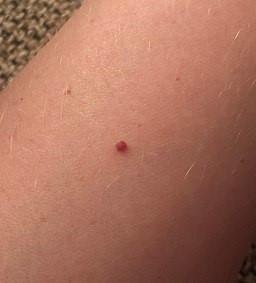Punto Campbell de Morgan
Revisado por Dr Toni Hazell, MRCGPÚltima actualización por Dr Rachel Hudson, MRCGPÚltima actualización 31 Oct 2024
Satisface las necesidades del paciente directrices editoriales
- DescargarDescargar
- Compartir
- Idioma
- Debate
Profesionales médicos
Los artículos de referencia profesional están diseñados para uso de los profesionales de la salud. Están escritos por médicos británicos y se basan en pruebas de investigación y directrices británicas y europeas. Puede que alguno de nuestros artículos sobre salud le resulte más útil.
En este artículo:
Sinónimos: hemangiomas cereza, angiomas seniles
Seguir leyendo
¿Qué son las manchas Campbell de Morgan?
Las manchas de Campbell de Morgan, también conocidas como angiomas en cereza, son lesiones cutáneas benignas frecuentes de mediana a avanzada edad, formadas por la proliferación de capilares dilatados y vénulas postcapilares. Deben su nombre a un cirujano inglés, Campbell de Morgan (1811-1876).
Causas de las manchas de Campbell de Morgan (etiología) 1 2
Su causa sigue siendo desconocida:
Algunos estudios han señalado una mayor incidencia en climas tropicales, diabetes, pacientes trasplantados e inmunodeprimidos.
El embarazo y los prolactinomas están asociados al desarrollo de lesiones, lo que implica a mediadores hormonales.
Las cifras aumentan con la edad, por lo que los factores asociados al proceso de envejecimiento pueden ser relevantes.
La exposición química (gas mostaza, 2-butoxietanol) provoca la aparición de múltiples lesiones.
Seguir leyendo
¿Qué frecuencia tienen las manchas de Campbell de Morgan? (Epidemiología)1 2
Se trata de la proliferación vascular cutánea más frecuente. Se han publicado pocos informes recientemente, pero se cree que hasta el 75% de las personas mayores de 75 años pueden padecerlas.
Aumentan en frecuencia y tamaño con la edad.
Su frecuencia aumenta a partir de los 40 años.
Pueden aparecer en cualquier parte, pero es más frecuente encontrarlas en el tronco.
Se observan en todas las razas y sexos.
Aspecto visual
Angioma cereza en brazo de adulto

Por Midasblenny, CC BY-SA 4.0vía Wikimedia Commons
Máculas de 1-3 mm de diámetro que pueden convertirse en pápulas más grandes con el tiempo.
Típico color rojo cereza brillante, pero puede parecer azul o morado.
No destiñen.
Seguir leyendo
Presentación
Suelen aparecer en el tronco y las extremidades superiores.
Pueden aparecer en cualquier zona de la piel, excepto en las mucosas. Se han descrito en el cuero cabelludo.1
Las lesiones pueden ser generalizadas, especialmente en los ancianos.
Suelen ser asintomáticos.
Diagnóstico diferencial
El diagnóstico suele ser claro clínicamente. El diagnóstico diferencial puede incluir:
Angioqueratoma.
Lagunas venosas (angiomas azules más frecuentes en los labios).
Gestión de manchas Campbell de Morgan
Tranquilizar: estas lesiones no suelen requerir tratamiento.
Muy ocasionalmente puede ser necesaria la extirpación si las lesiones se adhieren, o por razones estéticas.
Si se desea la extirpación, las opciones de tratamiento incluyen el legrado, el láser de colorante pulsado, el electrocauterio y la escisión.
También se ha demostrado que la escleroterapia es eficaz.3
Cuándo remitir
Cuando existe incertidumbre diagnóstica.
Cuando se requiera ayuda para la retirada.
Pronóstico
Las manchas de Campbell de Morgan son lesiones benignas.
Los problemas sólo surgen cuando las lesiones se traumatizan con frecuencia, siguen agrandándose o suponen un problema estético para el paciente.
Lecturas complementarias y referencias
- Angioma senilDermIS (Sistema de Información Dermatológica)
- Higgins JC, Maher MH, Douglas MSDiagnóstico de tumores cutáneos benignos comunes. Am Fam Physician. 2015 Oct 1;92(7):601-7.
- Angioma (adquirido) - incluyendo angioma en cereza / manchas de Campbell de MorganSociedad de Dermatología de Atención Primaria (PCDS)
- Kim JH, Park HY, Ahn SKAngiomas cereza en el cuero cabelludo. Case Rep Dermatol. 2009 Nov 11;1(1):82-86.
- AngiomasDermNet NZ
- Jairath V, Dayal S, Jain VK, et al.; ¿Es útil la escleroterapia para los angiomas en cereza? Dermatol Surg. 2014 Sep;40(9):1022-7. doi: 10.1097/01.DSS.0000452631.83962.58.
Seguir leyendo
Historia del artículo
La información de esta página ha sido redactada y revisada por médicos cualificados.
Próxima revisión prevista: 30 de octubre 2027
31 Oct 2024 | Última versión

Pregunte, comparta, conecte.
Explore debates, formule preguntas y comparta experiencias sobre cientos de temas de salud.

¿Se encuentra mal?
Evalúe sus síntomas en línea de forma gratuita